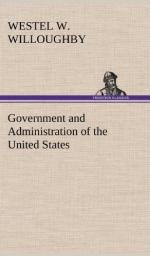In the first place, they claimed that their rights were received from, and their allegiance was due to the King, not to the Parliament. The colonists said the King was the only tie that bound them to England; that Parliament was composed of representatives from England alone, and therefore had powers of legislation only for England. Later, however, it was conceded that in matters of general interest to the whole United Kingdom, Parliament might exercise control, but that concerning all matters of domestic and internal interest, and of concern only to themselves, it was the right of their own legislatures to legislate, and that under this head came taxation.
Says Story:[1] “Perhaps the best summary of the rights and liberties asserted by all the colonies is contained in the celebrated declaration drawn up by the Congress of nine colonies assembled at New York in October, 1765 (Stamp Act Congress). That declaration asserted that the colonists ’owe the same allegiance to the Crown of Great Britain that is owing from his subjects born within the realm, and all due subordination to that august body, the parliament of Great Britain,’ That the colonists ’are entitled to all the inherent rights and liberties of his (the King’s) natural born subjects within the kingdom of Great Britain. That it is inseparably essential to the freedom of a people, and the undoubted rights of Englishmen, that no taxes be imposed on them but with their own consent given personally or by their representatives.’ That the ’people of the colonies are not, and from their local circumstances cannot be represented in the House of Commons of Great Britain. That the only representatives of these colonies are persons chosen by themselves therein; and that no taxes ever have been or can be constitutionally imposed upon them but by their respective legislatures, and that trial by jury is the inherent and invaluable right of every British subject in these colonies.’”
[Footnote 1: Commentaries, Vol. I, p. 175.]
In opposition to these views, the English government held that Parliament had the authority to bind the colonies in all matters whatsoever, and that there were no vested rights possessed by the colonies, that could not be altered or annulled if Parliament so desired.
At the beginning of the Revolutionary War, complete independence was not claimed by the colonies. It was not until July 4, 1776, that they were driven to a declaration of full and entire independence and self-government. By this declaration the colonies threw off their colonial character, and assumed the position of states. This they did by simply taking into their own hands the powers previously exercised by the English King and Parliament. In the state constitutions which many colonies formed during the year, their old colonial forms of government were closely followed. Connecticut and Rhode Island, in fact, merely declared their allegiance to England absolved, and retained unchanged their old charters as their fundamental law. In Connecticut no other state constitution was adopted until 1818, nor in Rhode Island until 1842.




